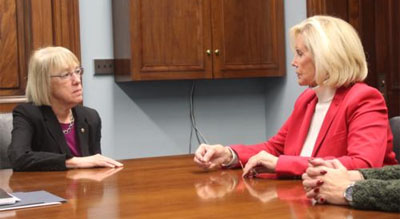NATIONAL
Murray reintroduces Lilly Ledbetter Paycheck Fairness Act

On Tuesday, Sen. Patty Murray met with Lilly Ledbetter, the inspiration behind the Lilly Ledbetter Fair Pay Act.
WASHINGTON, D.C. (Jan. 31, 2019) — U.S. Sen. Patty Murray (D-WA) on Wednesday reintroduced the Paycheck Fairness Act, legislation that would strengthen the Equal Pay Act of 1963 and guarantee that women can challenge pay discrimination and hold employers accountable. In the 116th Congress, the Paycheck Fairness Act will be designated H.R. 7 with Rep. Rosa DeLauro (D-CT) introducing the House companion legislation.
“Congress passed the Equal Pay Act more than 50 years ago, but the sad reality is that today women, on average, still only make 80 centers for every dollar men make,” Murray said. “For women of color—the pay gap is even worse. African American women working full-time only make 61 cents for every dollar white men make and Latinas on average are paid 53 cents for every dollar their white male colleagues make. The gender wage gap doesn’t just hurt women—it hurts families, communities, and our economy. So I’m proud to introduce the Paycheck Fairness Act today to make important updates to the Equal Pay Act and reaffirm that every worker in America has the right to receive equal pay for equal work.”
“Ten years ago, Congress and President Obama achieved an important victory for women seeking to challenge pay discrimination in court with the Lilly Ledbetter Fair Pay Act. But it was never intended for that bill to be passed as the only fix for the ongoing pay disparity between men and women,” said Lilly Ledbetter. “Women across the country still need the tools in the Paycheck Fairness Act to ensure they get equal pay for equal work. I applaud Congresswoman DeLauro for her leadership in this fight since 1997, as well as Speaker Pelosi for being a tireless advocate and making this a priority in the new Congress. Now is the time to get this done.”
The Paycheck Fairness Act would strengthen and close loopholes in the Equal Pay Act of 1963 by holding employers accountable for discriminatory practices, ending the practice of pay secrecy, easing workers’ ability to individually or jointly challenge pay discrimination, and strengthening the available remedies for wronged employees. The House legislation has 240 cosponsors (every Democratic Member of the House and one Republican Member) and the Senate legislation has 45 cosponsors.





